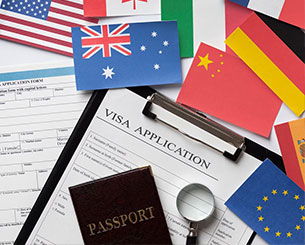Croatia Work Permits
Brochures
t is a long established fact that a reader will be distracted by the readable content of a page when looking at its layout
Location and Geography:
- Croatia is situated in Southeast Europe, bordered by Slovenia to the northwest, Hungary to the northeast, Serbia to the east, Bosnia and Herzegovina to the southeast, and Montenegro to the southeast. It has a long coastline along the Adriatic Sea to the west.
Capital and Largest City:
- The capital city of Croatia is Zagreb, which is also the largest city in the country.
Islands and Coastline:
- Croatia is known for its stunning coastline along the Adriatic Sea, featuring more than a thousand islands. The Dalmatian Coast is particularly famous for its picturesque landscapes.
Historical Sites:
- Croatia boasts a rich history and is home to numerous historical sites, including the historic city of Dubrovnik, which is a UNESCO World Heritage Site.
Plitvice Lakes National Park:
- Plitvice Lakes National Park, also a UNESCO World Heritage Site, is renowned for its cascading lakes and waterfalls, making it one of the most beautiful national parks in Europe.
Cuisine:
- Croatian cuisine is diverse, reflecting the country’s regional influences. Dishes often feature seafood, olive oil, and a variety of Mediterranean flavors. “Pasticada” and “Cevapi” are popular Croatian dishes.
Language:
- The official language is Croatian, which is a South Slavic language. English and German are also widely spoken, especially in tourist areas.
Currency:
- The official currency is the Croatian Kuna (HRK).
Game of Thrones Filming Location:
- The city of Dubrovnik served as a filming location for the popular TV series “Game of Thrones,” portraying the fictional city of King’s Landing.
Inventions:
- The necktie (cravat) is believed to have originated in Croatia. The word “cravat” is derived from the Croatian word “hrvatska.”
Natural Beauty:
- Croatia is known for its diverse landscapes, including mountains, lakes, and forests. The country offers opportunities for outdoor activities such as hiking, sailing, and exploring national parks.
Membership in the European Union:
- Croatia became a member of the European Union (EU) in 2013.
Sunniest Spot in Europe:
- The island of Hvar is often considered one of the sunniest spots in Europe, with over 2,700 hours of sunlight annually.
Croatian Traditional Music:
- “Klapa” music, a traditional form of a cappella singing, is recognized as part of Croatia’s intangible cultural heritage by UNESCO.
These facts provide just a glimpse into the rich cultural, historical, and natural aspects that make Croatia a fascinating and beautiful country.
Work Permits in Croatia:
Croatia, being a member of the European Union (EU), follows certain EU regulations regarding work permits. Please note that regulations and procedures may be subject to change, so it’s essential to check with the relevant authorities or consult legal experts for the most up-to-date information. Here’s a general overview of work permits in Croatia:
EU Citizens:
- Citizens of EU member states do not need a work permit to work in Croatia.
Non-EU Citizens:
- Non-EU citizens generally require a work and residence permit to work in Croatia.
Categories of Work Permits:
Temporary Stay and Work Permit:
- This permit is for non-EU citizens intending to work in Croatia for a specific period.
- It may be issued for employment, seasonal work, or other specific purposes.
Work Permit Process:
- Job Offer:
- A crucial step is to secure a job offer from a Croatian employer. The employer often plays a significant role in the work permit application process.
- Application Submission:
- The employee (or their employer) must submit the work permit application to the competent Croatian authorities.
- Approval from the Croatian Employment Service:
- The Croatian Employment Service (CES) typically reviews and approves the job offer to ensure it complies with local labor market regulations.
- Residence Permit Application:
- Once the job offer is approved, the employee can apply for a residence permit at the local police station or embassy/consulate in their home country.
- Health Insurance:
- Applicants usually need to provide proof of health insurance coverage valid in Croatia.
- Biometric Data Collection:
- The applicant may need to provide biometric data (fingerprints and a photograph) during the application process.
- Decision and Notification:
- After the application is processed, the applicant will be notified of the decision regarding the work and residence permit.
Work Permit Requirements:
- Valid Passport:
- A passport with sufficient validity is generally required.
- Job Offer:
- A formal job offer from a Croatian employer specifying details of employment.
- Work Contract:
- A signed work contract that complies with Croatian labor laws.
- Qualifications:
- Proof of qualifications or relevant experience required for the job.
- Health Insurance:
- Proof of health insurance coverage valid in Croatia.
- Proof of Funds:
- Evidence that the applicant has sufficient financial means to support themselves during their stay.
- Clean Criminal Record:
- A certificate proving the absence of a criminal record in the applicant’s home country.
It is crucial to consult with the Croatian Ministry of the Interior, the Croatian Employment Service, or seek legal advice for the most accurate and current information regarding work permits in Croatia. Additionally, applicants should be aware that requirements and processes may change, and the information provided here is based on the situation as of January 2022.
BENIFIT
Why Choose Our Immigration and Visa Consulting Services
If you’re considering why you should choose Jannat Immigration’s immigration and visa consulting services, here are some potential reasons they might highlight:


- Expertise
- Up-to-Date Information
- Global Presence
- Personalized Service
- Network and Collaborations
- Transparent Processes





